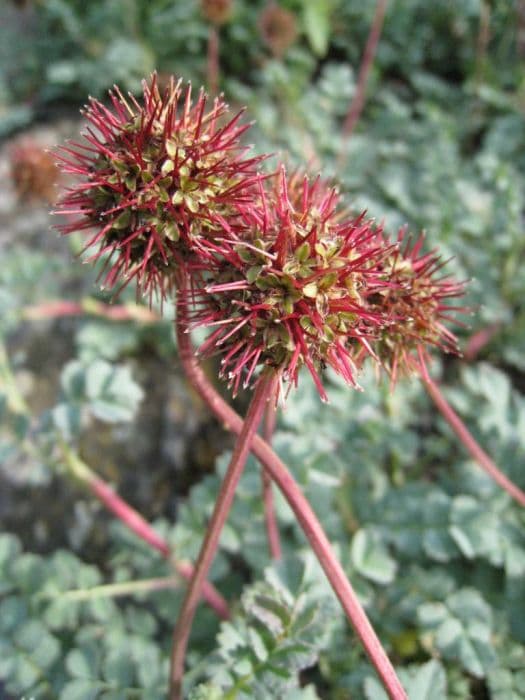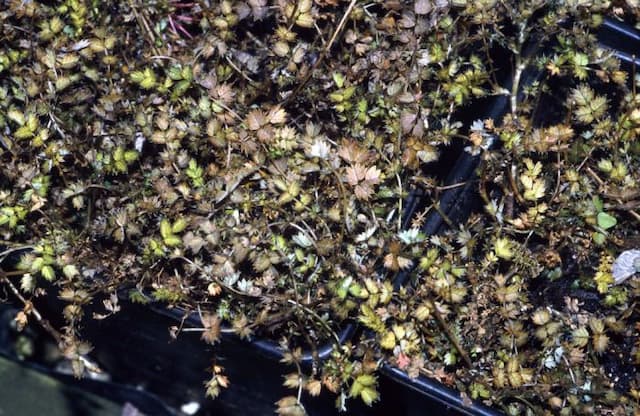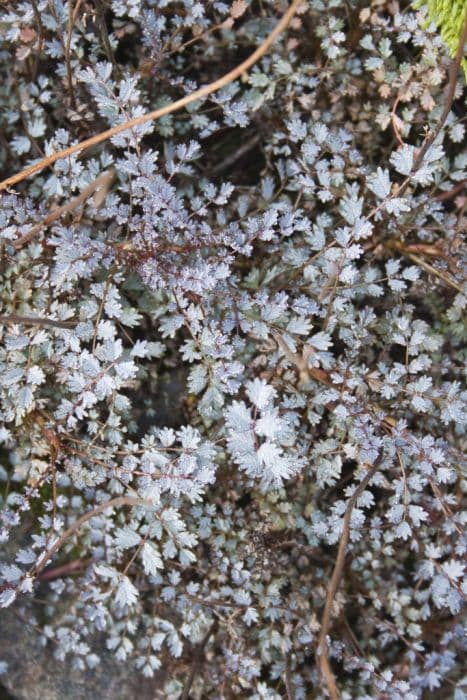Queen Mother Rose Rosa Queen Mother = 'Korquemu' (Patio)
![rose [Queen Mother]](/_next/image?url=https%3A%2F%2Fplants-admin.emdemapps.com%2Fimages%2Fplants%2F%2Fimages%2F604b5f7f21d11.png&w=3840&q=75)
ABOUT
The Rosa Queen Mother 'Korquemu' Patio is a charming variety of rose revered for its stunning flowers and compact growth habit. This particular plant is known for its profusion of blooms which cover the bush in great clusters, creating a striking visual display. The flowers themselves are of a classic rose shape, with a high-centered form that unfolds into a beautiful, open bloom. These roses are particularly noted for their soft pink color, which can range from pale, blush tones to more vibrant, warm pink hues, offering a gentle and inviting appearance. Each bloom comprises numerous ruffled petals that come together to form a full and lush flower, exuding a delicate and romantic essence. The petals often exhibit a subtle sheen, catching the light and adding to the enchanting quality of the plant. Adding to its beauty, the roses exude a delightful fragrance, which is mild and pleasant, often described as classic rose scent with hints of a sweet, fruity note. This scent can carry on the breeze and serve to attract pollinators, as well as admirers, to the garden. The foliage of the Rosa Queen Mother Patio is also worth noting, comprised of glossy, green leaves that provide an excellent contrast to the softness of the flowers. The leaves are typically ovate with a pointed end and a smooth margin, creating an overall lush and healthy backdrop for the stunning flowers. The plant maintains a well-groomed, neat appearance throughout its blooming season, making it a popular choice for garden enthusiasts seeking a tidy yet floriferous addition to their outdoor spaces. While the size of the plant is not the focus of this description, its compact form allows it to fit well in a variety of garden settings, which may include borders, flower beds, and even patio containers, where its ornamental value can be appreciated up close. This rose variety can be an excellent choice for gardeners who wish to introduce the timeless elegance of roses without demanding too much space.
About this plant
 Names
NamesSynonyms
Queen Mother Rose, Patio Rose.
Common names
Rosa 'Korquemu'.
 Toxicity
ToxicityTo humans
The plant in question is commonly known as the Patio rose. Patio roses, like other members of the Rosa genus, are not considered toxic to humans. They are widely grown for ornamental purposes, and while they are not meant for consumption, ingesting small quantities of their petals is generally not harmful. However, some people may have sensitivity or allergic reactions to roses, but this is not common. It's always best to discourage eating ornamental plants. Thorns on rose bushes can also cause physical injury if not handled with care.
To pets
The Patio rose is the common name of the plant Rosa Queen Mother 'Korquemu'. Roses are not toxic to pets; they are generally considered safe for dogs, cats, and horses. If a pet were to ingest rose petals, it is unlikely to cause poisoning. However, the thorns on rose bushes could potentially cause minor injuries if a pet were to chew on the branches or if a thorn became lodged in their skin. Care should be taken to ensure that pets do not ingest large quantities or the tougher parts of the plant, which could cause gastrointestinal upset or obstruction.
 Characteristics
CharacteristicsLife cycle
Perennials
Foliage type
Deciduous
Color of leaves
Green
Flower color
Pink
Height
1-2 feet (30-60 cm)
Spread
1-2 feet (30-60 cm)
Plant type
Shrub
Hardiness zones
Varies
Native area
Cultivar
Benefits
 General Benefits
General Benefits- Aesthetic Appeal: Produces beautiful pink flowers that enhance the visual appeal of gardens and patios.
- Compact Size: Ideal for limited spaces due to its patio rose classification, perfect for containers and small gardens.
- Scent: Offers a pleasant fragrance, contributing to a sensory garden experience.
- Ease of Care: Generally resilient and easy to maintain with proper care practices.
- Pollinator Attraction: Attracts bees and other pollinators, supporting local ecosystems.
- Long Blooming Period: Offers a lengthy season of blooming, providing consistent garden interest.
- Versatility: Suitable for various garden styles and can be used in mixed borders or as standalone features.
- Cut Flowers: Can be used to create attractive floral arrangements for indoor enjoyment.
 Medical Properties
Medical PropertiesThis plant is not used for medical purposes.
 Air-purifying Qualities
Air-purifying QualitiesThis plant is not specifically known for air purifying qualities.
 Other Uses
Other Uses- The Rosa Queen Mother can be used in potpourri due to its fragrant blooms that retain their scent when dried, providing a natural way to freshen up a room.
- Dried petals from the Rosa Queen Mother can be incorporated into homemade paper to add texture and color, giving a unique floral touch to the paper.
- Scented drawer liners can be crafted by infusing essential oils from the flowers into the paper, keeping clothes and linens smelling fresh.
- Used as natural dyes, the petals of the Rosa Queen Mother can impart subtle colors to fabrics, yarns, or even homemade cosmetics.
- These roses can be transformed into floral beads by pulverizing the petals and creating small beads, which can then be used to make jewelry.
- Petals of the Rosa Queen Mother can be frozen in ice cubes to add an elegant touch to drinks at a garden party or special occasion.
- Culinary creations, such as rose-infused sugar or syrups, can be made by steeping the petals in sugar or water, adding a floral note to recipes.
- The petals can also be used to decorate cakes and desserts, providing an edible garnish that's as beautiful as it is tasty.
- Creating a natural blush or lip stain with the pigments from the roses is a creative way to utilize the rich colors found in its blossoms.
- Flowers from the Rosa Queen Mother can be used to create eco-friendly confetti, which is biodegradable and adds a romantic touch to weddings or celebrations.
Interesting Facts
 Feng Shui
Feng ShuiThe Queen Mother rose is not used in Feng Shui practice.
 Zodiac Sign Compitability
Zodiac Sign CompitabilityThe Queen Mother rose is not used in astrology practice.
 Plant Symbolism
Plant Symbolism- Love: As with many roses, the Rosa 'Queen Mother' symbolizes love. The timeless association of roses with deep affection makes them an ideal gift for expressing romantic feelings.
- Beauty: The beauty of the delicate blooms is emblematic of physical and inner beauty. It's often given as a compliment to someone's grace and elegance.
- Honor: Named after the Queen Mother, this rose embodies honor and reverence, suitable for paying tribute to someone who is deeply respected.
- Devotion: Roses are also linked to a strong commitment and loyalty, making the 'Queen Mother' rose a symbol of unwavering dedication to a loved one or a cause.
- Admiration: The rose's unique charm and poise make it an expression of admiration for someone's qualities and achievements.
 Water
WaterThe patio rose 'Queen Mother' should be watered deeply and evenly to ensure the soil is moist, particularly during dry spells. Water this plant once or twice a week, allowing the soil to dry out slightly between waterings. To prevent diseases, avoid getting water on the leaves and instead water at the base of the plant. During the growing season, the rose may need approximately 1 to 1.5 gallons of water each week, depending on the climate and weather conditions. It's important to adjust watering based on rainfall, less in rainy periods and more in times of drought.
 Light
LightPatio roses like the 'Queen Mother' thrive in full sunlight, requiring at least 6 hours of direct sun daily. The best spot for this plant would be an area that receives morning sunlight and is protected from the intense afternoon heat, if possible. They can also grow in partial shade, but flowering might be reduced in less light.
 Temperature
TemperatureThe 'Queen Mother' patio rose prefers temperate conditions and is hardy in a range of climates. It can generally survive winter temperatures down to about 20 degrees Fahrenheit and continue to thrive during the summer heat as long as it is well-watered. The ideal temperature for this rose is between 65 and 75 degrees Fahrenheit, which encourages healthy growth and blooming.
 Pruning
PruningPruning the 'Queen Mother' patio rose is essential for maintaining plant health, encouraging new growth, and improving air circulation. Prune once in early spring, removing dead or weak wood and shaping the plant. Periodically throughout the growing season, deadhead spent flowers to promote further blooming. The best time to do major pruning is when the plant is dormant, late winter or early spring, just before new growth begins.
 Cleaning
CleaningAs needed
 Soil
SoilThe best soil mix for a patio rose is well-draining with organic matter, such as a 50/50 mix of loam and compost. The soil pH should be around 6.0 to 6.5 for optimal growth.
 Repotting
RepottingPatio roses like the 'Rosa Queen Mother' should be repotted every two to three years to refresh the soil and provide room for growth.
 Humidity & Misting
Humidity & MistingRoses prefer moderate humidity levels but are adaptable; they do not require specific humidity control when grown outdoors.
 Suitable locations
Suitable locationsIndoor
Place in bright indirect light, and prune to maintain size.
Outdoor
Choose a sunny spot, enrich soil with compost, ensure good drainage.
Hardiness zone
5-9 USDA
 Life cycle
Life cycleThe Rosa 'Queen Mother' begins its life cycle with seed germination, where the seed absorbs water and the embryo inside resumes growth, eventually emerging from the soil as a seedling. As the seedling establishes, it develops roots and shoots, growing into a young plant with characteristic leaves and stems specific to patio roses. The vegetative growth stage follows, where the plant matures and the stems elongate, leaves expand, and the root system strengthens to support the growth of flowers. Flowering occurs during the reproductive stage, with the Rosa 'Queen Mother' producing clusters of blooms that may be pink or blush in color, providing nectar and pollen to attract pollinators. After pollination, the plant may produce hips (fruit) containing seeds, completing the reproductive cycle. The plant enters a period of dormancy in autumn and winter, conserving energy before resuming growth in the next spring.
 Propogation
PropogationPropogation time
Spring to early summer
Propogation: The Rosa Queen Mother, a patio rose variety, is best propagated through softwood cuttings. This method is most effective in late spring to early summer when new growth is tender and flexible. To propagate, a gardener would cut a healthy piece of new growth, about 6 to 8 inches (15 to 20 centimeters) long, ensuring it has several leaves but the lower leaves are removed. The cut end is then dipped in rooting hormone powder to encourage root development and planted in a pot filled with a well-draining medium like a mix of potting soil and perlite. The cutting should be kept in a warm, humid environment under indirect light until roots have developed, which usually takes several weeks. Once rooted, the new plant can be gradually acclimated to outdoor conditions and eventually planted in the garden.









